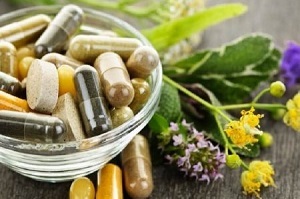
Chronic prostatitis is an insidious disease. Its transition into a state of remission causes the patient to feel euphoric and fully recover. Refusal to continue treatment is fraught with new exacerbations of the disease, the appearance of cystitis, kidney failure and the development of inflammation of the prostate into a malignant form.
In order to avoid these consequences, experienced urologists advise patients not to stop fighting the disease, but to continue the treatment of chronic prostatitis with folk remedies.
Traditional ingredients
Treatment of prostatitis with folk remedies was and is in demand for many reasons. First, they are tried and tested, and second, most of them are cheaper than modern drug therapies. However, it is incorrect to compare the effectiveness of herbal and pharmaceutical treatments as the latter always take precedence. The role of herbal medicine is less reduced to eliminating the disease than to relieving its symptoms.
Folk remedies for prostatitis are not just herbal preparations and other herbal medicines. Also used in home medicine:
- various beekeeping products (apitherapy);
- non-vegetable natural substances;
- massage;
- exercise;
- Warm up, compress.
Phytopreparations and other drugs used to treat prostatitis at home should only be purchased from pharmacies. For self-collecting herbs, you must have adequate knowledge and be able to rely on the medicinal properties of the collected plants. Traditional methods of treating prostatitis are only effective if they are properly collected and properly prepared.
As a result of the biochemical research carried out, individual components of folk recipes have already been included in the composition of modern certified medicines.
The use of folk recipes requires caution. Their effects on the human body can lead to the appearance of allergy symptoms, increased pressure, gastrointestinal tract malfunction and the like. The choice of alternative treatments should be left to the treating physician.
Greens, vegetables and herbs in the fight against prostatitis

Treating prostatitis at home mainly involves the use of herbal remedies. It must be borne in mind that herbal medicine is a symptomatic measure. It helps relieve symptoms, including difficulty urinating, weakened erectile function, and pelvic pain.
If, with the help of a doctor, the patient has already determined how to get rid of prostatitis at home, then you need to buy all the necessary ingredients (these must be indicated in the recipe). After that, you can easily treat prostatitis at home.
Parsley seeds have long been used for prostatitis. In addition to having a diuretic effect, this remedy can reduce inflammation in acute prostatitis and relieve symptoms in chronic prostatitis. Like the stems and all other parts of the plant, they contain flavonoids. The seeds need to be ground and poured with boiling water in a glass of water for 1, 5 tablespoons of parsley seed powder. After 15 minutes, the infusion is ready and is drunk 4 times a day for one tablespoon.
Parsley can be used as a remedy for prostatitis by rubbing fresh stems and leaves and then squeezing them. You need to take a tablespoon of this parsley juice 30 minutes before a meal. If you rub the root of the plant, half of the juice will be enough. With such treatment, it should be borne in mind that excessive juice consumption can have adverse effects on the liver and kidneys. To prevent the disease, it is enough to add parsley to dishes every day. Remedies made from these herbs will help with such an unpleasant symptom as incomplete emptying of the bladder.
Prostatitis treatment at home is inconceivable without pumpkin. It was used in all kinds of foods, cooked gruel from pumpkin mash, ate seeds, and made butter from them. The latter remedy is considered to be one of the most effective in the fight against male infertility and inflammation of the prostate. You can only eat porridge with pumpkin and rice with the addition of honey and walnuts, but optionally you can also eat pumpkin seeds (only in their raw form - they lose their healing properties when fried). Eating raw pumpkin seeds daily is very beneficial for treating chronic prostatitis in men, and also prevents inflammation of the prostate.
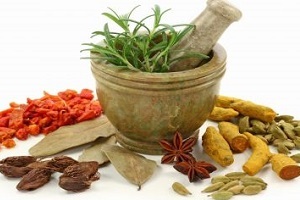
Traditional medicine for prostatitis recommends both onions and garlic. The content of a large amount of vitamins, antihypertensive and antimicrobial substances make this vegetable indispensable for the male diet. You can make microclysters with garlic. It is mixed with honey and poured with boiled water in a proportion of 1/3 clove of garlic and an incomplete teaspoon of honey in 200 ml of water (glass). After 5 minutes, filter and apply. This is a very effective home treatment for prostatitis. If a man has chronic prostatitis, then you need to eat raw onions and garlic every day and add them to vitamin salads or fried eggs.
Treatment of prostatitis in men with folk remedies is also possible with the help of turmeric. Known as a spice, turmeric is an excellent antibacterial agent. The finely grated root is filled with water in the amount of a glass of water for 2 tablespoons of turmeric, half a glass is drunk daily.
When treating prostatitis with folk remedies, it is necessary to take into account individual sensitivity. As effective as the drugs are, they can be dangerous in terms of side effects.
If we talk about turmeric, unlike parsley, it cannot be consumed daily, and even more so in large quantities, since it can lead to dysbiosis (this spice affects the intestinal flora of the human body). Turmeric is used with caution to treat prostatitis at home in men who have a history of diabetes mellitus, glaucoma, high blood pressure and problems with the cardiovascular system. If a man has had a stroke, it is better to choose another folk remedy for the treatment of prostatitis.
Drugs made from dried nettle are also an effective therapy for chronic prostatitis. Infusions and decoctions from it affect the hormonal background and the inflammatory process in the prostate. When diagnosing chronic prostatitis, in traditional medicine, dioecious nettle seeds are used according to the following recipe: they need to be poured with dry wine (in the proportion of 0. 5 liters of wine per 5 tablespoons of dried seeds) and heated in a water bath (the water shouldbe hot but not boiling) let cool for 5 minutes, then after sifting, drink 2 tablespoons before bed.
Some popular recipes recommend applying freshly plucked nettles to the perineal area: this is believed to induce a blood rush, and thus helps treat chronic prostatitis. However, the formic acid contained in the stinging cells of freshly picked nettles can cause burns and allergic reactions.
Nettle preparations are contraindicated for kidney failure and a tendency to edema, for circulatory disorders (varicose veins) and inflammatory vascular diseases (thrombophlebitis).

Echinacea juice has long been used for medicinal purposes, as well as for tinctures on seeds and crushed roots of the plant. Echinacea purpurea stimulates the immune system, supports the body's defenses and helps in healing against bacterial and viral infections. You can buy ready-made tincture in pharmacies. If the prostate becomes inflamed, take a teaspoon of tincture every two hours, and chronic prostatitis in remission is treated with beverages containing echinacea juice.
Cranberry is often used for prostatitis. The berries can be eaten raw or made into cranberry drinks. This remedy is very effective when the first signs of the disease appear. You can also make preparations from lingonberries, especially jam. This is one of the ways to treat prostatitis at home in winter when fresh cranberries are hard to come by. You can also make a tincture from fresh berries: a glass of vodka is taken for 100 g of berries (do not grind the berries! ). The dishes are placed in a dark place for 2 weeks. After meals, you need to take a teaspoon three times a day. Cranberry juice and jelly can be eaten daily. Treatment with cranberry juice is contraindicated in the case of increased acidity of the gastric juice, as well as gastric and duodenal ulcers.
However, the most effective drugs for the treatment of prostatitis with folk remedies are obtained through the combined use of medicinal plants. This is especially true of herbal teas. However, when herbal preparations are used in conjunction with traditional pharmacology, it should always be borne in mind that traditional methods can either weaken or enhance the effects of the pharmacopoeia. Sometimes it becomes harmful to health.Despite all the undisputed advantages of home medicine, it cannot be perceived as a panacea and miracle that can heal quickly and forever. Traditional medicines are much more effective. In addition, the advice on the eternal cure of prostatitis with the help of traditional medicine should be received with healthy skepticism, since it is hardly possible, for example, to recover from chronic inflammation of the prostate, especially after 60 years. Another thing is that with proper use of medicinal herbs, the prostate may not get larger and the symptoms of the disease will be easier.
Treatment with honey and bee products
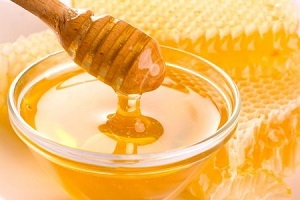
Propolis is a unique product that is used in most folk recipes not only for the treatment of prostatitis. It is a natural antibiotic, has beneficial effects on the immune system, prevents the development of infections and has analgesic properties. In the treatment of chronic prostatitis, the use of a tincture or rectal suppository is recommended. Both forms of the drug can be made independently.
To make the tincture, put 10 g of crushed propolis in a glass container, pour 250 ml of medical alcohol diluted to 75% or use vodka, close the container tightly and store in a cool, dark place for 10 days.
The drug is taken daily on an empty stomach, diluting the required dose of the drug in 200 ml of warm milk. In addition, on the first day of admission, this dose is 10 drops. Every 2 days it is increased by 3 drops. The course of treatment is designed for 20 days. On the last day of administration, the dose of the drug is 40 drops.
Original components of rectal suppositories:
- rendered pork fat - 100 g;
- propolis - 30 g;
- natural wax - 25 g.
Melt the fat in a water bath while stirring and add chopped propolis. To achieve an even consistency of the composition and add crushed wax. After the wax has completely dissolved, remove solid inclusions from the melt and allow to cool. Cut the frozen melt into thin strips. Form cylindrical candles 30mm long and 10mm in diameter, which should be kept in the freezer.
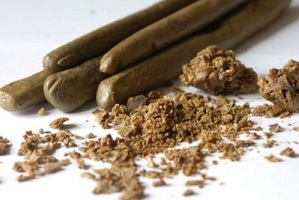
During treatment, it is recommended to use the prepared suppositories daily for 30 days, inserting them deeper into the rectum. In case of remission of the disease or during prophylaxis, it is advisable to reduce the frequency of using suppositories to twice a week.
Apitherapy (treatment with bee waste) should only be used after an allergy test. It is known that honey, propolis, etc. can often cause allergic reactions.
Honey is used both in its pure form and with other medicines. It can be mixed with:
- cranberries;
- chopped parsley (vegetables, root);
- carrot juice;
- Pumpkin seeds twisted in a meat grinder and so on.
Pumpkin seeds
Traditional methods of treating chronic prostatitis with pumpkin seeds are recognized as effective by most representatives of official medicine. This is due to the fact that, as studies have shown, the seeds contain a significant amount of trace elements (zinc, manganese, molybdenum, iron), organic acids, healthy fats and vitamins A, E, D.
These components improve the course of metabolic processes in the prostate, increase male reproductive capacity, and the recently discovered delta-7 sterol acts on the seminal vesicles and the prostate itself, suppressing the inflammatory process and activating the genitourinary system, resulting in the complete elimination of theIllness symptoms leads. . .
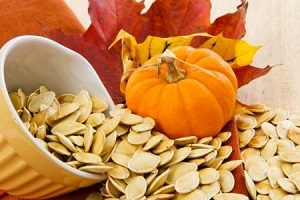
Purified pumpkin seeds are not effective enough to treat chronic prostatitis. They keep the necessary concentration of nutrients and their medicinal properties only in living form, unrefined and not previously heat-treated.
The easiest and least troublesome way to make a drug for treating chronic prostatitis is powder. Pumpkin seeds are processed into flour with a household grinder (coffee grinder, mixer or meat grinder). The therapeutic course lasts a month. Method of application: 1 tablespoon of the drug 2 times a day before meals.
To increase the effectiveness of the treatment, it is recommended to drink the dry preparation with water, in which 2-3 teaspoons of honey are previously dissolved. Treatment lasts for a month.
For those with a sweet tooth, you can use the recipe for making pumpkin balls, according to which 500 g of pumpkin seed flour should be mixed with 200 g of honey, and the resulting composition should be cooled to a pasty consistency in the refrigerator. When the required density is reached, form balls with a diameter of 1. 5 to 2 cm from the resulting dough, which are then stored in the freezer.
Instructions for use: Dissolve one ball before breakfast. The duration of treatment is at least 30 days. Positive results of treatment when using pumpkin seeds with honey appear within one and a half to two weeks after starting treatment.
horse chestnut
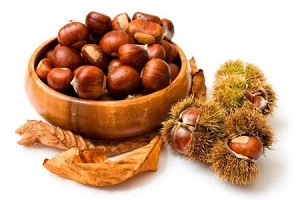
Another great recipe for a remedy for chronic prostatitis is horse chestnut peel tincture. Low toxicity, the presence of active substances in the drug (Fraxin, Esculin and Excin) led to its widespread use in official medicine in the treatment of many diseases. The tincture of horse chestnut peel relieves inflammation and swelling, improves blood circulation and eliminates venous blood stasis, which has a beneficial effect on the condition of the prostate.
To make the tincture, you need 25 g of chopped peel and 250 g of alcohol, diluted to a concentration of 75%, or vodka. The prepared dish is poured into a glass container, poured with alcohol and left for 21 days in a dark, cool place. The tincture must be shaken at regular intervals. Before use, the liquid is peeled through several layers of gauze.
When collecting raw materials for the preparation of the drug, do not use chestnuts that have been collected on city streets or near highways and industrial plants.
Method of application: The tincture is taken 10-15 drops twice a day in the morning and evening after meals. The therapeutic admission course should not exceed 14 days. After 30 days, it is recommended to repeat the course of treatment.
In regions where horse chestnut does not grow, you can use a standard pharmaceutical preparation that contains thiamine chloride (a source of vitamin B1) in addition to chestnut extract.
Aloe
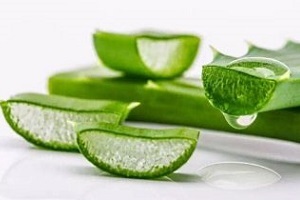
Aloe or agave is a favorite plant of traditional healers. Its medicinal properties have long been recognized by pediatricians and experienced therapists. Biochemical studies have shown that, in addition to a whole range of vitamins (A, C, E, H, P, P1) and amino acids, aloe juice contains protein structures and enzymes that can eliminate inflammatory processes of various etiologies, as well as the anthraquinone compounds it contains - good anesthetics. Protease, emodin and acemannan contained in the plant offer the possibility of effectively combating neoplasms.
That is why the agave takes a special place in the list of recipes for curing chronic prostatitis with folk remedies. The easiest thing to do is to chew the leaves of the plant on an empty stomach daily before you have breakfast. For treatment, you should use the oldest, fleshiest leaves, closer to the base. Before use, the sheet must be washed well and, after cutting off the side thorns, it must be divided into several fragments 3-4 cm long. Unused leaf fragments can be stored in the refrigerator by placing them in a paper bag for later use. The therapeutic approval period is 30 days.
Of course, chewing an aloe leaf on an empty stomach does not give a man a pleasant taste. But there are also more gentle traditional treatment methods with this plant. A treatment method with aloe infusion with honey with the addition of Cahors is particularly popular with urologists.
The medicinal product contains the following ingredients:
- fresh, thinly cut aloe leaves - 0. 5 kg;
- bee honey (linden or buckwheat) - 0, 5 l;
- Cahors - 0. 5 l.
The plant leaves are selected and processed as in the first recipe. All components are thoroughly mixed in a glass container and placed in the refrigerator for 10 days. The resulting infusion is filtered through several layers of cheesecloth.
Take the infusion three times a day before meals as follows:
- 1st week - 1 teaspoon each;
- 2nd week - 1 tablespoon each.
According to urologists, the method described enabled many patients to get rid of chronic prostatitis within two weeks.
Exercise and massage
To prevent a cured prostatitis from returning, you need to regularly do simple exercises to maintain health. When you wake up in the morning, you need to lie on your back, bend your knees and pull to your chest. Even 5 minutes in this position is good prevention of prostatitis. You don't need to do this exercise for more than 20 minutes.

Squats, which must be included in morning exercises, help with prostatitis. The day ends with a walk in the fresh air. Those who walk a lot are much less likely to develop prostatitis than drivers and men who lead a sedentary lifestyle.
In addition, every man can massage the perineum independently in the morning, 5 minutes is enough. However, such a procedure as prostate massage is performed only by specialists. It is hardly possible to do this alone.
Bath against prostatitis
A visit to the bathroom has a curative effect on patients with chronic prostatitis, provided the man:
- does not use any contrast media (alternating heat and cold).
- wasn't in the steam room too long.
With other forms of prostate inflammation, bathing should be treated with caution. Doctors generally recommend visiting the bathhouse only during remission, in other cases there is a risk of your condition worsening.
It is very good to drink a decoction of medicinal plants (chamomile, sage, St. John's wort) after the bath. In the pharmacy, you can buy special herbal teas to drink after taking a bath. You can combine bathing procedures with medicinal microclysters based on herbal remedies.
Home medicine can be very effective as an adjuvant, but the answer to the question of whether prostate inflammation can only be cured with home methods cannot be answered in the affirmative. As good as traditional medicine is, pharmacology is always more effective. Some patients only need surgery, which herbal medicine and other similar methods cannot replace. In any case, therapy with folk remedies must be approved by a doctor. He also needs to be addressed urgently if health has deteriorated with the use of non-traditional treatments.


























